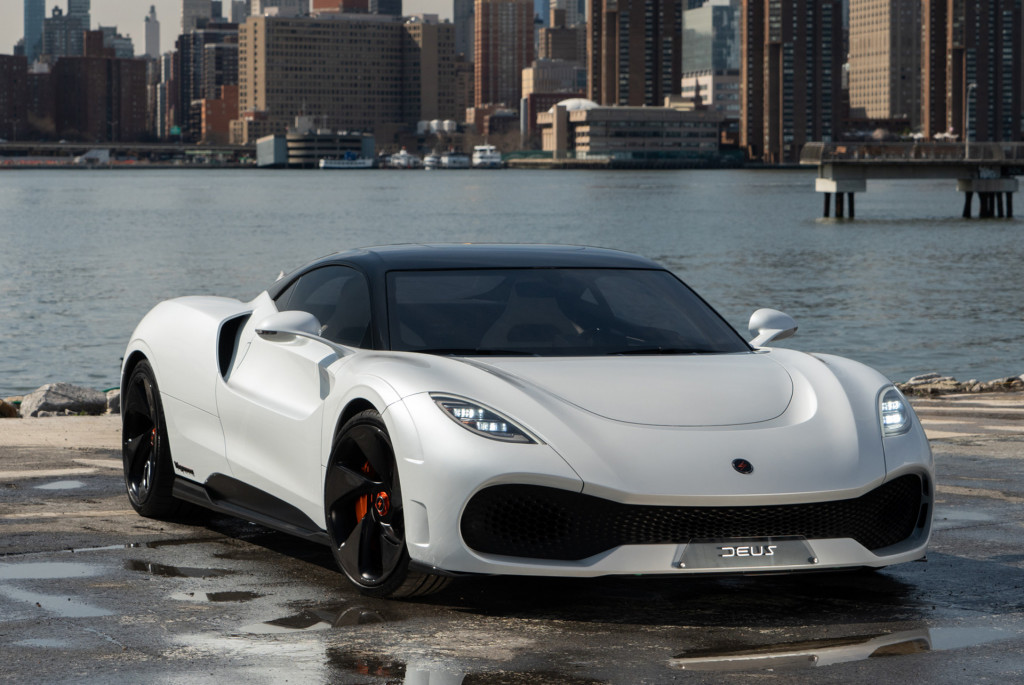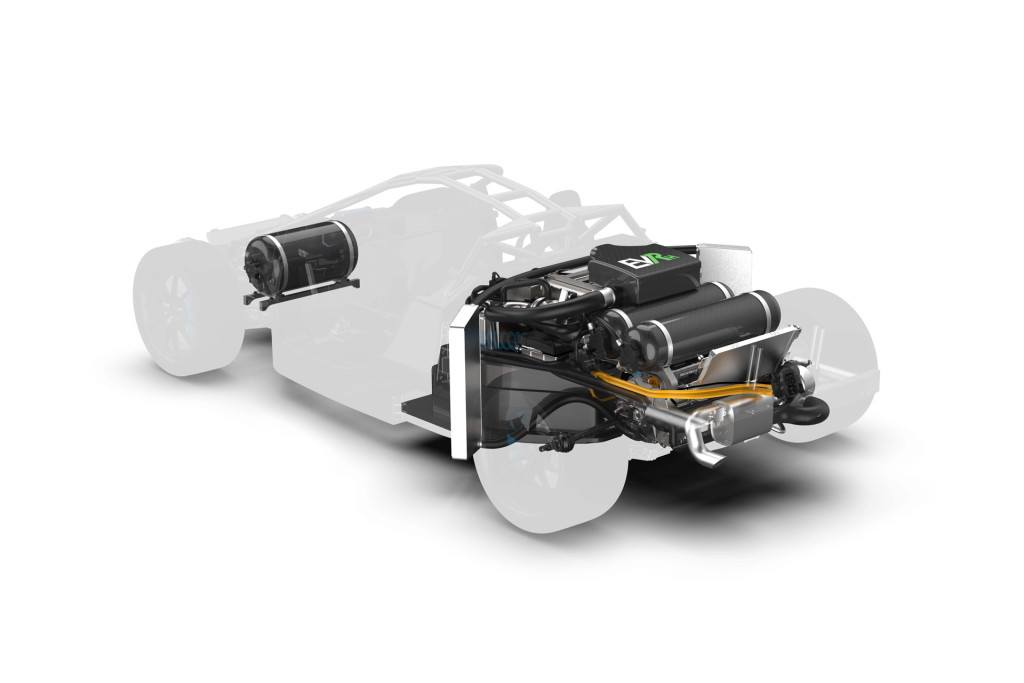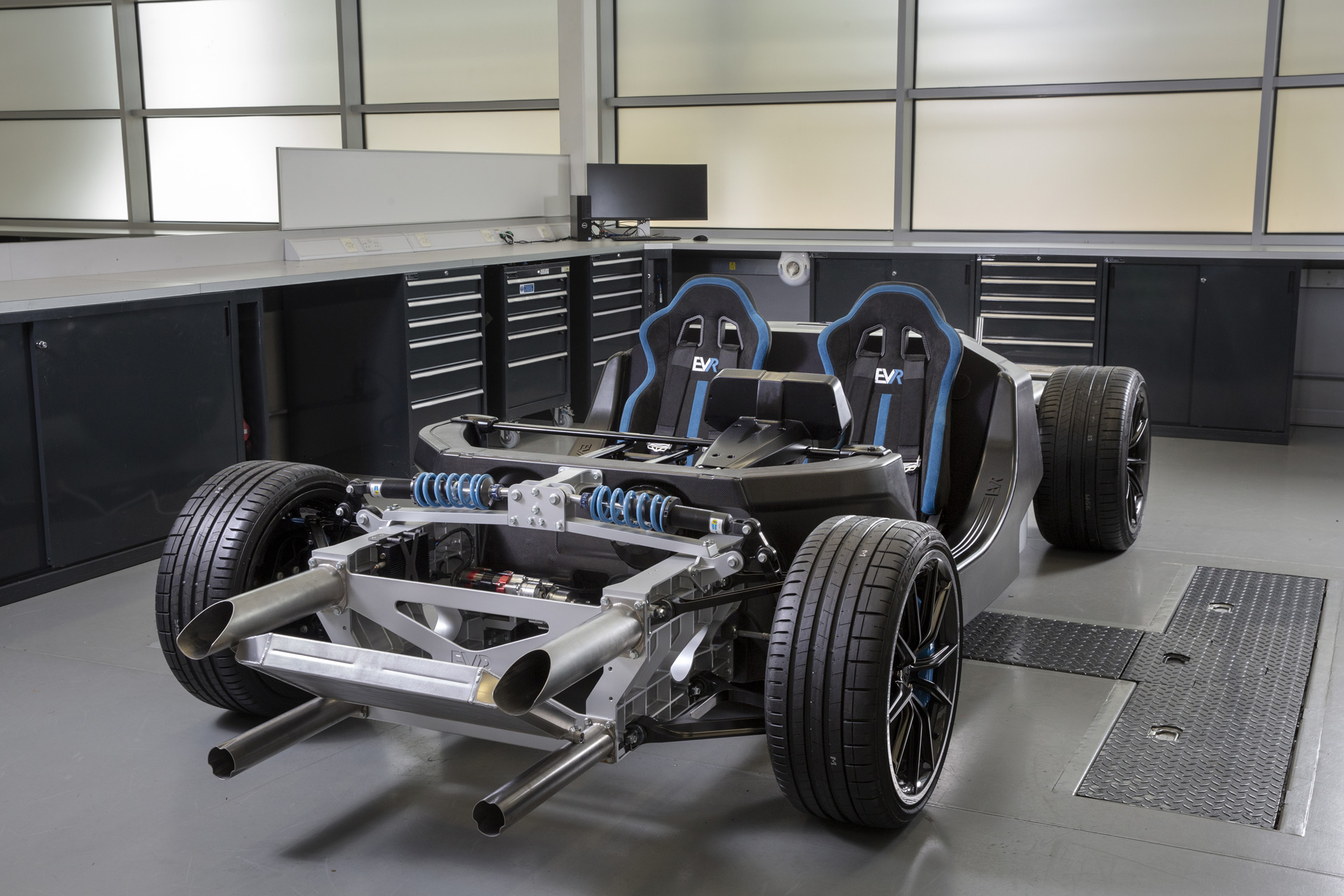Williams Advanced Engineering (WAE), the former technology offshoot of the Williams Formula 1 team, used this week’s Low Carbon Vehicle Show in the U.K. to present the EVR, a modular electric-vehicle platform designed specifically for hypercar applications.
The company in 2021 presented a similar platform known as the EVX, which was developed to suit a variety of body styles and could support outputs as high as 1,341 hp. The EVR is more limited in the types of vehicles it can support, though its power band runs up to 2,212 hp.
Despite still being in development, the platform already has a customer in the form of Deus. The Austrian startup in April presented an electric hypercar built around the EVR platform.

Deus Vayanne
The EVR features a lightweight composite structure that serves as the passenger cell, with the battery mounted behind it instead of in the floor, like in most EVs on sale today. Porsche took a similar route with its Mission R electric race car concept unveiled in 2021. The design avoids the issue of having a raised floor, while also replicating the familiar weight distribution of a mid-engine car. The EVR has also been designed without a roof, ensuring it supports open-top body styles.
The battery is an 85-kwh unit that WAE claims should deliver approximately 280 miles of range, and both rear- and all-wheel-drive configurations are supported. The range will depend largely on how the vehicle is driven. Making 0-60 mph acceleration runs in less than 2.0 seconds and driving up to the 248-mph top speed will certainly curb the range dramatically.
WAE said the EVR can be updated over time as battery and electric motor technology improves. The company also has a version of the platform that supports a hydrogen fuel cell stack as a range extender.

Williams Advanced Engineering EVR modular electric vehicle platform with fuel cell range extender
While companies can order the platform as a rolling chassis, WAE also plans to offer a turnkey solution in which the company can deliver a working prototype within 12 months of the project launch and a production vehicle within 24 months.
The Low Carbon Vehicle Show runs until Sept. 8 at the U.K.’s Millbrook Proving Ground. WAE also used the event to present a modular battery system for EVs, as well as a Triumph electric motorcycle prototype featuring one of its powertrain designs.
WAE was split off from the Williams F1 team in January when it was acquired by Fortescue Metals Group, an Australian mining company that intends to tap the engineering company’s expertise for the development of eco-friendly freight trains, mining trucks, and industrial heavy mobile equipment. However, WAE plans to continue offering its engineering services to third parties, as well as off-the-shelf solutions like the EVX and new EVR platforms.

cheap lasuna online – order himcolin pills himcolin for sale
besivance where to buy – besivance without prescription buy sildamax tablets
buy benemid online cheap – probenecid uk tegretol 400mg pill
brand mebeverine – cheap colospa buy pletal 100 mg online cheap
buy generic voltaren – buy generic diclofenac cost aspirin 75mg
buy rumalaya paypal – buy generic amitriptyline cost amitriptyline 50mg
generic pyridostigmine 60mg – mestinon 60mg pills azathioprine 50mg tablet
oral diclofenac – nimotop cost buy nimotop sale
buy ozobax online cheap – piroxicam 20mg drug feldene 20 mg generic
buy generic mobic – cheap toradol 10mg order toradol without prescription
order periactin 4 mg generic – buy cyproheptadine online buy tizanidine 2mg generic
artane over the counter – diclofenac gel buy online purchase emulgel for sale
buy accutane 40mg sale – how to get accutane without a prescription buy deltasone 20mg online
generic omnicef – order generic cleocin buy generic cleocin online
prednisone without prescription – buy prednisolone generic elimite medication
betamethasone 20gm drug – adapalene usa buy benoquin paypal
purchase flagyl online – buy flagyl 200mg generic purchase cenforce pill
augmentin tablet – buy synthroid generic synthroid 150mcg usa
buy generic clindamycin – indomethacin canada indomethacin pills
order cozaar 25mg generic – order cephalexin 500mg pill order cephalexin 500mg sale
eurax drug – purchase mupirocin sale aczone us
buy bupropion medication – xenical 60mg ca shuddha guggulu tablets
provigil 100mg oral – modafinil 100mg canada meloset ca
prometrium 200mg uk – clomiphene 100mg price cheap clomiphene tablets
capecitabine uk – buy xeloda generic danocrine 100 mg for sale
aygestin 5mg cost – norethindrone 5 mg ca buy yasmin tablets
バイアグラ通販 – г‚·гѓ«гѓ‡гѓЉгѓ•г‚Јгѓ« гЃЇйЂљиІ©гЃ§гЃ®иіј г‚їгѓЂгѓ©гѓ•г‚Јгѓ« гЃЇйЂљиІ©гЃ§гЃ®иіј
eriacta colon – zenegra online wait forzest aside
valif pills manner – buy sustiva tablets purchase sinemet online cheap
order provigil 100mg sale – cefadroxil buy online combivir ca
ivermectin 12mg pills for humans – ivermectin 6mg for humans carbamazepine for sale
order promethazine generic – lincomycin over the counter purchase lincocin online cheap
buy generic azithromycin 500mg – tindamax 500mg cost cheap bystolic 20mg
omnacortil 10mg over the counter – buy prometrium 100mg online buy progesterone 100mg generic
buy gabapentin 600mg pill – buy clomipramine without a prescription itraconazole 100 mg ca
clavulanate cheap – buy nizoral 200mg for sale duloxetine 20mg us
amoxiclav sale – order augmentin online cheap buy duloxetine 40mg generic